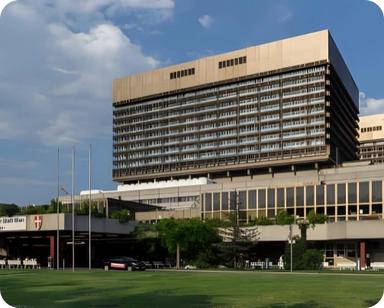الحزم تبدأ من
$11000
هل تحتاج إلى مساعدة في اختيار الحزمة المناسبة لرحلتك الطبية؟
بياناتك الصحية محمية معنا

تحويل الحياة بـ جراحة استئصال الكبد (تليف الكبد)
استئصال الكبد هو إجراء جراحي يتضمن إزالة جزء من الكبد. يتم استخدامه عادةً في الحالات التي يتأثر فيها الكبد بحالات مثل الأورام أو السرطان النقيلي أو أمراض الكبد الموضعية الأخرى. في سياق تليف الكبد ، قد يتم إجراء استئصال الكبد إذا كانت هناك حاجة لإزالة قسم من الكبد بسبب مضاعفات مثل سرطان الكبد ، وهو تطور شائع في المراحل اللاحقة من تليف الكبد.
الجوانب الرئيسية لاستئصال الكبد لتليف الكبد:
- غاية: في حين أن استئصال الكبد لا يعد علاجًا لتليف الكبد في حد ذاته، إلا أنه يستخدم لمعالجة المضاعفات الناجمة عن تليف الكبد، وخاصة سرطان الكبد.
- إجراء: تتضمن الجراحة الاستئصال الجراحي لجزء من الكبد. نظرًا لأن الكبد لديه القدرة الفريدة على التجديد ، يمكن إزالة جزء مهم بأمان إذا كان الكبد المتبقي صحيًا بما فيه الكفاية. يعتمد المبلغ الدقيق الذي تم إزالته على حالة الكبد وموقع وحجم الورم أو الأنسجة التالفة.
- التقنيات: يمكن إجراء عملية استئصال الكبد باستخدام الجراحة المفتوحة التقليدية أو من خلال تقنيات طفيفة التوغل مثل الجراحة بالمنظار، والتي تتضمن شقوقًا أصغر وتؤدي عادةً إلى أوقات تعافي أسرع.
- استعادة: يختلف التعافي بعد العملية الجراحية بشكل كبير. تشمل العوامل مدى الجراحة ، وصحة المريض العامة ، وقدرة الكبد المتبقية على العمل. يمكن أن يستمر التعافي في المستشفى من بضعة أيام إلى أسبوع، مع الحاجة إلى عدة أشهر للتعافي الكامل.
- المخاطر والاعتبارات: ينطوي استئصال الكبد على مخاطر مثل النزيف والعدوى والمضاعفات المتعلقة بوظيفة الكبد. التقييم الدقيق قبل الجراحة والمراقبة بعد الجراحة أمر بالغ الأهمية ، لا سيما بالنظر إلى الحالة المخاطرة للكبد في مرضى تليف الكبد.
يعد استئصال الكبد لمرضى التليف الكبهي قرارًا معقدًا يتضمن وزن فوائد إزالة الأنسجة المريضة ضد مخاطر انخفاض وظيفة الكبد بعد العملية. غالبًا ما يتم تنسيق هذا الإجراء بواسطة فريق من المتخصصين في أمراض الكبد والجراحة والأورام.
5.0
95% مصنف قيمة مقابل المال
لماذا تختارونا؟
98%
معدل النجاح
4+
جراحة استئصال الكبد (تليف الكبد) الجراحين
9+
جراحة استئصال الكبد (تليف الكبد)
4+
المستشفيات في جميع أنحاء العالم
12+
الحياة التي تم لمسها
نظرة عامة
استئصال الكبد هو إجراء جراحي يتضمن إزالة جزء من الكبد. يتم استخدامه عادةً في الحالات التي يتأثر فيها الكبد بحالات مثل الأورام أو السرطان النقيلي أو أمراض الكبد الموضعية الأخرى. في سياق تليف الكبد ، قد يتم إجراء استئصال الكبد إذا كانت هناك حاجة لإزالة قسم من الكبد بسبب مضاعفات مثل سرطان الكبد ، وهو تطور شائع في المراحل اللاحقة من تليف الكبد.
الجوانب الرئيسية لاستئصال الكبد لتليف الكبد:
- غاية: في حين أن استئصال الكبد لا يعد علاجًا لتليف الكبد في حد ذاته، إلا أنه يستخدم لمعالجة المضاعفات الناجمة عن تليف الكبد، وخاصة سرطان الكبد.
- إجراء: تتضمن الجراحة الاستئصال الجراحي لجزء من الكبد. نظرًا لأن الكبد لديه القدرة الفريدة على التجديد ، يمكن إزالة جزء مهم بأمان إذا كان الكبد المتبقي صحيًا بما فيه الكفاية. يعتمد المبلغ الدقيق الذي تم إزالته على حالة الكبد وموقع وحجم الورم أو الأنسجة التالفة.
- التقنيات: يمكن إجراء عملية استئصال الكبد باستخدام الجراحة المفتوحة التقليدية أو من خلال تقنيات طفيفة التوغل مثل الجراحة بالمنظار، والتي تتضمن شقوقًا أصغر وتؤدي عادةً إلى أوقات تعافي أسرع.
- استعادة: يختلف التعافي بعد العملية الجراحية بشكل كبير. تشمل العوامل مدى الجراحة ، وصحة المريض العامة ، وقدرة الكبد المتبقية على العمل. يمكن أن يستمر التعافي في المستشفى من بضعة أيام إلى أسبوع، مع الحاجة إلى عدة أشهر للتعافي الكامل.
- المخاطر والاعتبارات: ينطوي استئصال الكبد على مخاطر مثل النزيف والعدوى والمضاعفات المتعلقة بوظيفة الكبد. التقييم الدقيق قبل الجراحة والمراقبة بعد الجراحة أمر بالغ الأهمية ، لا سيما بالنظر إلى الحالة المخاطرة للكبد في مرضى تليف الكبد.
يعد استئصال الكبد لمرضى التليف الكبهي قرارًا معقدًا يتضمن وزن فوائد إزالة الأنسجة المريضة ضد مخاطر انخفاض وظيفة الكبد بعد العملية. غالبًا ما يتم تنسيق هذا الإجراء بواسطة فريق من المتخصصين في أمراض الكبد والجراحة والأورام.






















